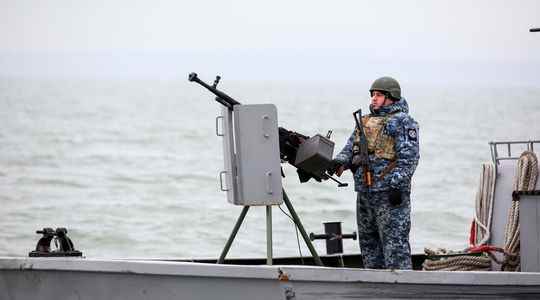After the assertion of the United States that a Russian attack could take place “at any time” in the coming days, the tension has risen again a notch in Ukraine. While its president remains convinced that a diplomatic solution can be found, exchanges between Russian and Ukrainian representatives and Western countries – including France – are increasing. But many Western states have called on their nationals to leave Ukraine as soon as possible, suggesting the worst.
- Recall of Ambassadors and Nationals
The United States ordered, on Saturday, the withdrawal of the majority of the staff of its embassy in Kiev. The embassy will maintain just a small consular presence in Lviv, western Ukraine, 70 km from the Polish border, to handle urgent issues. Washington also announced the withdrawal of almost all of the last American soldiers – around 160 – present in the country. They will be “repositioned elsewhere in Europe,” the State Department said. If a Russian offensive – which can “begin at any time and without warning” according to the website of the US Embassy in Kiev – takes place, “US nationals […] must be aware that the government will not be able to evacuate (them), “warns Washington.
Many countries – but not France – have followed the same path: United Kingdom, Belgium, Norway, Netherlands, Canada, Australia, Japan, Israel… “We urge British nationals to leave immediately by commercial means as long as they remain available,” a spokesman for the UK Foreign Office said. Same injunction on the website of the German Foreign Ministry: “If you are currently in Ukraine, make sure that your presence is imperative. If this is not the case, leave the country at short notice”. The institutions of the European Union have recommended that their non-essential staff of the representation in Kyiv telework from abroad.
Russia, too, has recalled some of its diplomatic staff, claiming to fear adverse “provocations”.
- Russia maneuvers at sea and on land
Adding to the tensions, Moscow launched, this Saturday, new naval maneuvers of magnitude in the Black Sea. “More than 30 ships of the Black Sea Fleet sailed from Sevastopol and Novorossiysk according to the exercise plan,” the Defense Ministry said. “The purpose of the exercise is to defend the sea coast of the Crimean Peninsula, the bases of the forces of the Black Sea Fleet, as well as the objects of the country’s economic sector (…) from possible military threats “, specifies the Russian ministry. The Ministry of Defense also claimed that the Russian Navy had chased a US submarine from its waters in the Pacific Ocean on Saturday morning.
Since last November, Moscow has massed nearly 100,000 troops on Ukraine’s borders, raising fears of an attack. Russia denies any such plans. On Thursday, tens of thousands of Russian soldiers began large-scale exercises in Belarus, a country neighboring Ukraine, which should in theory last until February 20. Through all these maneuvers, Russia de facto encircles its pro-Western neighbor.
- White House fears Russian attack ‘at any moment’
In view of the military movements, the United States said on Friday that Russia could invade Ukraine “at any time” in the coming days. Even “during the Olympic Games” in Beijing which end on February 20. “We continue to see signs of Russian escalation, including the arrival of new forces on the Ukrainian border,” White House national security adviser Jake Sullivan warned after a virtual meeting of top leaders. Westerners.
Russia, via the voice of Maria Zakharova, spokesperson for Russian diplomacy, denounced “the hysteria of the White House” which “is more revealing than ever. The Anglo-Saxons need a war. At all costs. provocations, misinformation and threats are the preferred method of solving one’s own problems,” she said. Sergei Lavrov, Russian Foreign Minister, stressed “that the propaganda campaign launched by the United States and its allies on “Russian aggression” against Ukraine is aimed at provocation”.
- Ukraine denounces the provocation of a “panic”
And in the middle, Ukraine. President Volodymyr Zelensky considers the position of the United States to be alarmist. “Right now, our enemies’ best friend is panic in our country. And all this information (about a possible attack) only causes panic and does not help us,” he said on Saturday. Despite the Russian military exercises, the Ukrainian head of state is convinced that diplomacy remains a fundamental card to play for the resolution of the crisis. “We work at the diplomatic level, we talk every day with the authorities of various countries, their leaders, at different levels. This is why we consider that the diplomatic channel is the only way to achieve de-escalation”, a- he added.
- Diplomatic phone calls
To lower the tension, diplomatic calls have intensified in recent days between representatives of all countries. US and Russian Defense Ministers Lloyd Austin and Sergei Shoigu “discussed the strengthening of Russian forces in Crimea and around Ukraine”, according to a brief account released by the Pentagon.
French President Emmanuel Macron spoke this Saturday for 1 hour 40 minutes with his Russian counterpart Vladimir Putin. The first warned the second that a “sincere dialogue was not compatible with a military escalation” on the Ukrainian border, according to the Elysée. Both “expressed a desire to continue the dialogue” on “the ways to move forward on the implementation of the Minsk agreements”, on the Donbass and on “the conditions for security and stability in Europe”. Emmanuel Macron also relayed “the concerns of his European partners and his allies”. US President Joe Biden has also planned to meet during the day with Vladimir Putin.
